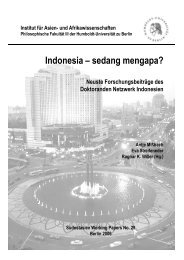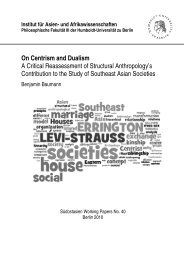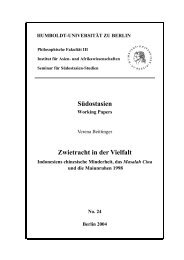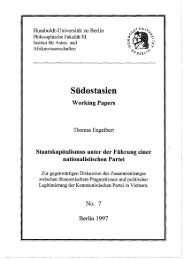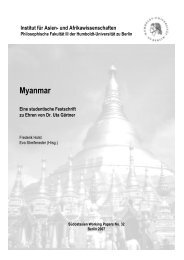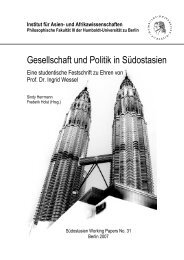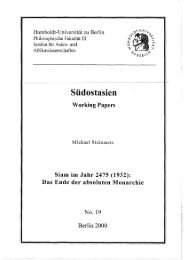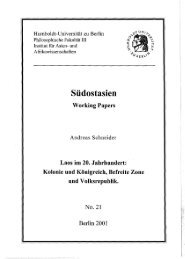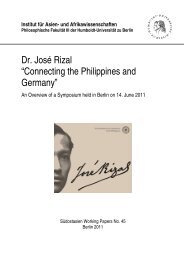in Maluku was “basically not a religious conflict, but more an inter-communal conflict driven by localeconomic disparities, instigated by certain forces bent on destabilizing the country”. 19Many Indonesian commentators point to the crucial role the military played in the context. GeorgeAditjondro concludes that violence in Maluku was fomented and maintained by a network of retiredand active military officers who deployed thousands of Muslim fighters after the internal fighting inMaluku was declining and transformed the conflict into a civil war. 20 Against this Jakarta-centric view,Gerry van Klinken argues that the conflict had a fundamentally local character, driven by a corruptlocal bureaucracy and unemployed youth. 21Despite many comments that the situation in the Moluccas was tense and rife for conflict, ordinaryresidents do not appear to have had anticipated violence. 22 While tensions between Muslims and Christiansexisted before the conflict, societies in Malukan towns and villages were not simply divided byreligious lines. Nils Bubandt remarked that tensions of various sorts also took place throughoutMaluku before 1999, but these were at times seen locally to be ethnic and at other times class-based. 23In conclusion, the violence in Maluku along religious lines is not self-explanatory in the context oflarge-scale factors as regime change and strong religious movements. The European Commissionstated that “reconciling the views that the Maluku violence was either a local spontaneous phenomenon(…) versus the perception that it has been ‘engineered’ from Jakarta is an important issue forMoluccans and Indonesians”. 24 However, indicators for both perceptions appear to exist. This portendsthe crucial interaction between the local and the national level in the construction and prolongation ofthe conflict and will be elaborated in the following sections.Indonesia during Reformasi: The Struggle for Regime Survival and Muslim PoliticsThree aspects set the stage for the violence in Maluku, its subsequent interpretation and the transformationof conflict: the alliance of ultra-conservative Muslim groups with the authoritarian regimeagainst a democratic oriented opposition of secular nationalists and Muslim moderates; the military’sstruggle for power and influence during the transition; and a popular anti-Christian discourse thatemerged in the wake of the financial crisis and was subsequently employed to the Maluku conflict.Suharto’s Final YearsDuring the 1990s, Indonesia witnessed the creation of a movement for democracy that united Indonesiansfrom various religious backgrounds. 25 Among its Muslim proponents, a key role was played by anew class of intellectuals providing solid Islamic justifications for democracy and civil society. 26Indonesia in the 1990s had a wealth of activists and intellectuals and was one of the most importantcentres of Muslim reformation in the world. Islamic reform-oriented organisations and religious eliteswere crucial during the struggle with the authoritarian regime in the 1990s and the subsequent deepen-19Briefing by the Foreign Minister, H.E. Alwi Shihab to Foreign Ambassadors in Jakarta on Aceh, Maluku and Irian Jaya,Jakarta, 7 July 2000. http://www3.itu.int/MISSIONS/Indonesia/nb00725b.htm.20Aditjondro, Guns, Pamphlets and Handie-Talkies, 122.21Gerry van Klinken (2001) The Maluku Wars: Bringing Society Back. In: Indonesia 71, 8.22See the report by Human Rights Watch and its detailed interviews with residents: HRW (1999) The Violence in Ambon.23Bubandt, Malukan Apocalypse, 247.24Mawdsley, Nick, Monica Tanuhandaru and Kees Holman (2002) Report of the EC Conflict Prevention Assessment MissionIndonesia. European Commission Conflict Prevention and Crisis Management Unit: Indonesia.25Hefner, Civil Islam, 8.26Künkler, Das Verhältnis Staat-Religion und der Rolle islamischer Intellektueller in der indonesischen Reformasi, 2.18
ing of democratic attitudes and processes. 27 The confrontation between the authoritarian regime and ademocratic opposition set the stage for a political struggle that pitched Suharto supporters allied withconservative Islamists against reform-oriented secular nationalists and moderate Muslim intellectualsduring the transition.When Suharto came to power in 1966, Muslims looked with high hopes toward the new regime, havingbeen previously marginalized from national politics and economic life under the Dutchadministration and the years of Soekarno’s reign. The ‘New Order’ (1966-1998), however, did notaccommodate these high hopes. Instead, it found a middle way by suppressing Muslim organisationsand civilian politics, but encouraged Muslim piety as a ground for public morality, a shield againstWestern influence and as an antidote to communism. 28 The resurgence of political Islam in the contextof a general Muslim renewal during the 1970s and 1980s forced the regime to adopt new strategies asit sought to gain control over Muslim forces and the democratic opposition movement. AbdurrahmanWahid, head of Nahdlatul Ulama (NU), Indonesia’s biggest Muslim organisation, and MegawatiSoekarnoputri, leader of the nationalist faction and daughter of Indonesia’s national hero and firstpresident, were personal friends. 29 This made an alliance of the secular nationalists and reform-orientedreligious groups against Suharto likely.Suharto’s influence among the military and the middle class was eroding. The first family’s excessivecronyism raised hostility among the most loyal Suharto supporters. More importantly, privately-heldenterprises began to dominate the economy while state-owned industries, in which many militaryretirees found employment, began to decline, thus undermining a patrimonial system. 30 The foundationof ICMI, the Association of Indonesian Muslim Intellectuals, was meant to consolidate Suharto’s supportamong Muslim activists. It emerged under the auspices of Suharto’s confidant, B.J. Habibie andbecame his personal platform in his presidential aspirations. ICMI established an Islamic bank and aMuslim quality newspaper that was meant to break the hold of the leading Christian-owned newspaperson the reading public. 31 This Suharto move attempted to polarise his challengers and createcleavages within Muslim organisations. Opponents to ICMI initiatives were repeatedly labelled as“Christians” or, less frequently, as “Nationalists”, although the opposition was much more varied, inorder to establish a regime-conform Islamic mainstream. 32In response to the founding of ICMI, Wahid founded the Forum Demokrasi in 1991. It became ahighly respected multi-religious platform of high-ranking Indonesian intellectuals and members fromthe political, the military and the cultural sphere that opposed the authoritarian regime. The coalitionof moderate Muslims, Christians, secularists and representatives of other religions united in theiropposition to the Suharto regime and thus laid the foundation for the protest movements that eventuallybrought down Suharto in 1998. 33The Asian financial crisis in 1997 hit Indonesia hard and resulted in a dramatic economic downturn.The poverty rate, having fallen to less than 14% nationwide, soared up to 40% by late 1998. 34 The crisisrepresented a window of opportunity for the pro-democracy movement. Demands for far-reachingreforms came from all sides of the political spectrum. For the first time, the opposition openly united2728293031323334Hefner, Civil Islam, 2.Hefner, Civil Islam, 59.Hefner, Civil Islam, 59.Hefner, Civil Islam, 158.Van Bruinessen, Islamic State or State Islam?, 1.Hefner, Civil Islam, 141.Künkler, Zum Verhältnis Staat-Religion, 18.Hefner, Civil Islam, 198.19
- Seite 1: Institut für Asien- und Afrikawiss
- Seite 4 und 5: SÜDOSTASIEN Working PapersISSN: 14
- Seite 7: VorwortBoryano Rickum und Eva Strei
- Seite 10 und 11: Theoretischer Zugang: Waldschutzkon
- Seite 12 und 13: Zum anderen ist ein weiteres Proble
- Seite 14 und 15: verbleiben die Landrechte beim Staa
- Seite 16 und 17: Dutschke, Michael/Wolf, Reinhard (2
- Seite 18 und 19: Many commentators perceive religion
- Seite 22 und 23: around Wahid’s NU, Megawati’s n
- Seite 24 und 25: groups were uniting against Suharto
- Seite 26 und 27: end to the military’s political r
- Seite 28 und 29: January 20, the second day of viole
- Seite 30 und 31: When violence broke out in Maluku i
- Seite 32 und 33: children, were burned to death in t
- Seite 34 und 35: support of some elements in the arm
- Seite 36 und 37: interpretations and instrumentaliza
- Seite 38 und 39: Soei Liong, Liem (2002) It’s the
- Seite 40 und 41: Malaysia) war einer der wichtigsten
- Seite 42 und 43: Rückkehr und ReintegrationBereits
- Seite 44 und 45: NGO-Aktivist. Beide Kandidaten hatt
- Seite 46 und 47: Gastland. Darüber hinaus finden wi
- Seite 48 und 49: tergehen. Die Unterzeichner und Her
- Seite 51 und 52: 4 Remembering the dark: The Japanes
- Seite 53 und 54: le for the creation of certain iden
- Seite 55 und 56: Remembering and forgettingWith thes
- Seite 57 und 58: These fragments of the social memor
- Seite 59 und 60: The policy of remembrance’s diffe
- Seite 61 und 62: ConclusionThe task of this essay wa
- Seite 63 und 64: 5 Euro-asiatische Kindheit im Batav
- Seite 65 und 66: mal 25 Jahre einschließen. Im Zent
- Seite 67 und 68: erzogen, lässt sich nicht verallge
- Seite 69 und 70: Formale Voraussetzungen für eine e
- Seite 71 und 72:
Frau. Eine Frau durfte nie Vormund
- Seite 73 und 74:
Lebenshaltungskosten in Batavia war
- Seite 75 und 76:
Die fehlende Zuwendung des Vaters z
- Seite 77 und 78:
angelegt wurde, so z.B. zum Kirchga
- Seite 79 und 80:
ihrem Ehemann Joan van Hoorn an ihr
- Seite 81 und 82:
icht teilnehmen. Die Sorge um die K
- Seite 83 und 84:
asiatischen Familien und zum andere
- Seite 85 und 86:
Niederländer schickten ihre Kinder
- Seite 87 und 88:
Dies wurde allerdings verzeichnet,
- Seite 89 und 90:
Die meisten der Mischlingskinder wu
- Seite 91 und 92:
über das private Zusammenleben inn
- Seite 93 und 94:
Internetquellenhttp://hadith.al-isl
- Seite 95 und 96:
6 Freundschaft als soziale Praxis:i
- Seite 97 und 98:
laritäten und Überlagerungen mit
- Seite 99 und 100:
seiner Funktion auf individueller u
- Seite 101 und 102:
zunächst grob die wichtigsten sozi
- Seite 103 und 104:
Freundschaften „indonesisch“ od
- Seite 105 und 106:
Die Sphären lokalkulturell (javani
- Seite 107:
Haller Dieter (2001) Entwurf einer
- Seite 110 und 111:
Die Dia’ang betreiben als Bauern
- Seite 112 und 113:
tragen werden würde, die hier vorb
- Seite 114 und 115:
den traditionellen Schutz- und Gege
- Seite 117:
Über die AutorInnenNicola Borchard
- Seite 120:
22. Heinz Schütte (2003) Hundred F



